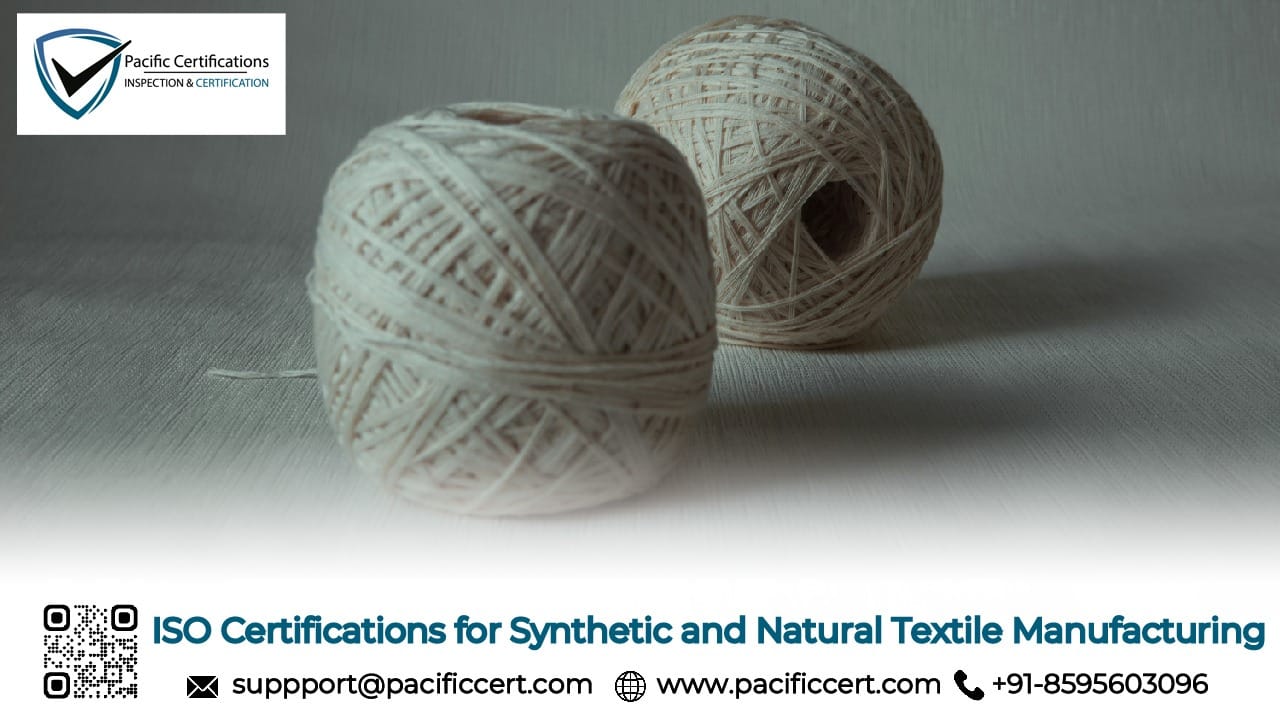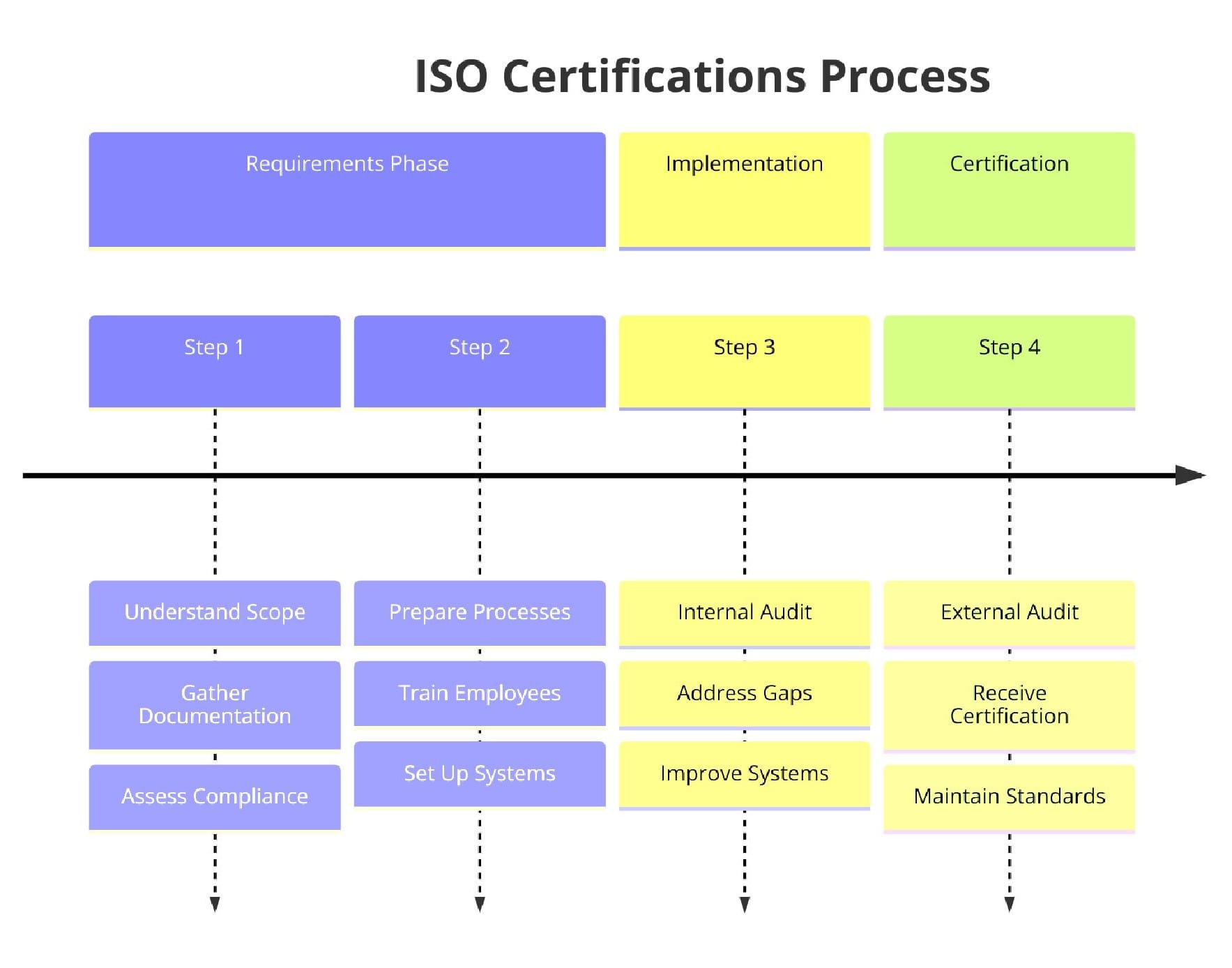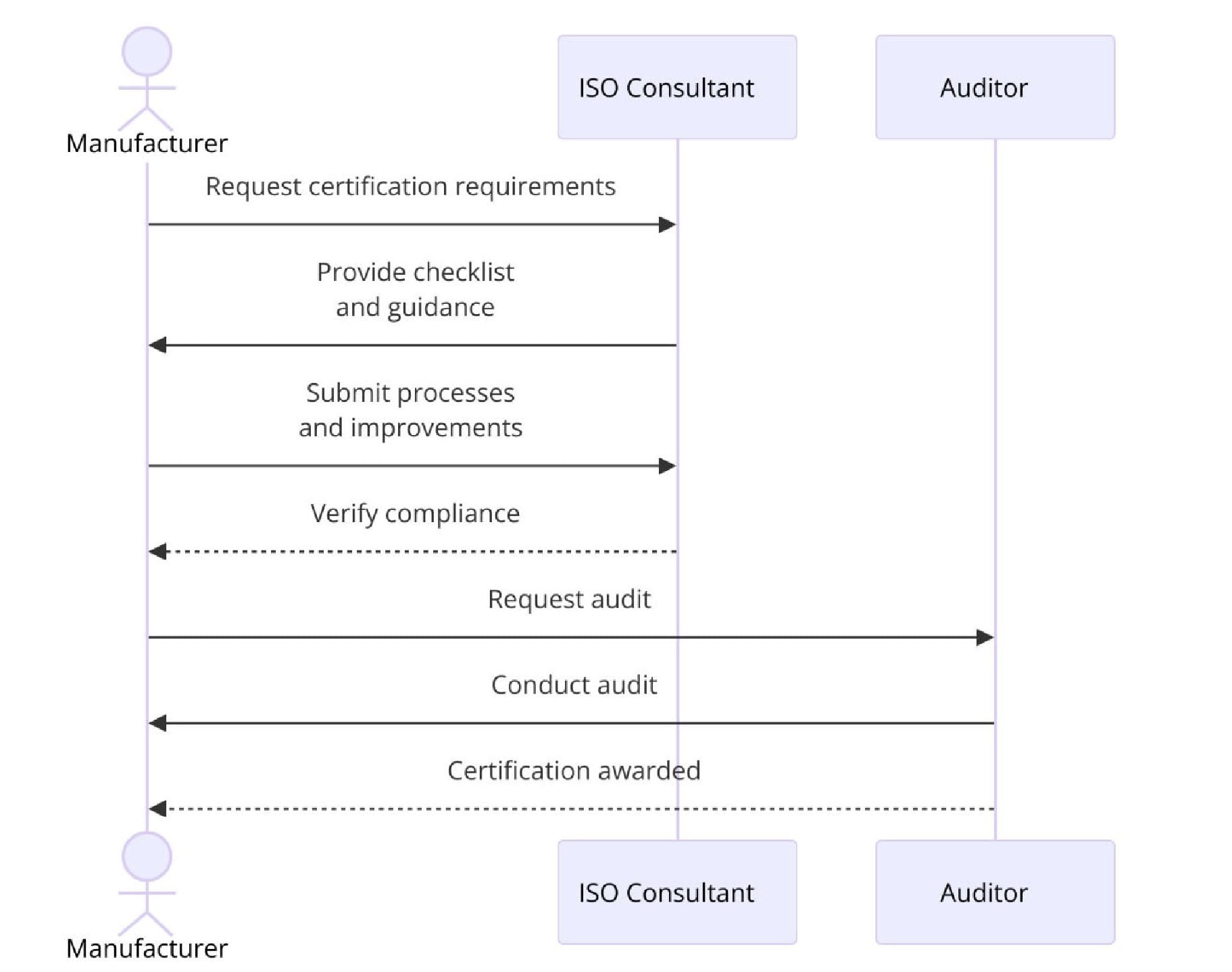ISO Certifications for Synthetic and Natural Textile Manufacturing Businesses, Requirements and Benefits

The textile industry, encompassing both synthetic and natural fabrics, is at the heart of global commerce and sustainability efforts. Ensuring quality, safety, and environmental stewardship is crucial in this sector. ISO certifications for synthetic and natural textile manufacturing offer a globally recognized framework to maintain these standards, ensuring compliance and building consumer trust.

ISO (International Organization for Standardization) has set benchmarks for textiles, focusing on quality management, environmental responsibility, and operational efficiency. By adhering to these standards, manufacturers not only streamline processes but also meet growing consumer and regulatory demands.
If you need ISO certification for synthetic and natural textile manufacturing, contact us at [email protected] or call +91-8595603096 for expert assistance.
Applicable ISO Standards for Synthetic and Natural Textile Manufacturing
Several ISO standards apply to the textile industry. These standards address quality, sustainability, safety, and environmental impact. Below are the key certifications that cater to synthetic and natural textile manufacturers:
ISO 9001: Quality Management Systems (QMS)
ISO 9001 emphasizes quality assurance and customer satisfaction. Textile manufacturers use this standard to ensure consistent production quality, minimize defects, and enhance operational efficiency.
ISO 14001: Environmental Management Systems (EMS)
Sustainability is a priority in modern textile manufacturing. ISO 14001 helps organizations manage their environmental responsibilities effectively, reducing waste and promoting eco-friendly practices.
ISO 45001: Occupational Health and Safety Management
Textile manufacturing involves complex machinery and chemical processes. ISO 45001 ensures that manufacturers provide safe working environments, minimizing risks and protecting employee health.
ISO 26000: Social Responsibility
This standard is voluntary but critical in demonstrating ethical practices. It focuses on fair labor conditions, community involvement, and transparent business operations in the textile sector.
ISO 50001: Energy Management Systems
Energy efficiency is pivotal for cost-effective textile production. ISO 50001 provides a framework for optimizing energy use, reducing operational costs, and limiting carbon footprints.
ISO 20471: High-Visibility Clothing
For manufacturers of safety textiles, ISO 20471 ensures compliance with high-visibility requirements, critical in industries like construction and road safety.
ISO 20743: Determination of Antibacterial Activity of Textile Products
This standard applies to manufacturers producing antibacterial fabrics, often used in healthcare and sports apparel.
ISO 1833: Textile Fiber Composition Testing
ISO 1833 ensures the accurate identification of fiber composition in textiles, ensuring product labeling and compliance with market regulations.
Click here to find out more applicable standards to your industry
At Pacific Certifications, we specialize in providing comprehensive audit and certification services for synthetic and natural textile manufacturing. As a globally recognized certification body, we facilitate the ISO certification process, ensuring manufacturers meet the required standards effectively and efficiently.
Our certification services aim to:
- Streamline compliance processes.
- Provide internationally recognized credentials.
- Strengthen trust among stakeholders.
With years of experience and expertise, Pacific Certifications supports businesses in achieving global competitiveness through ISO certification.
Achieve globally recognized ISO certification for your textile manufacturing processes. Email us at [email protected] or contact us at +91-8595603096 for details.
Requirements of ISO Certifications for Synthetic and Natural Textile Manufacturing
Adhering to ISO standards requires a strategic approach. Below are the common requirements across key certifications in the textile sector:

Quality Assurance: Under ISO 9001, manufacturers must establish a quality management system (QMS) that ensures customer satisfaction and product consistency. This involves:
- Documented processes.
- Regular internal audits.
- Corrective and preventive actions.
Environmental Responsibility: ISO 14001 requires organizations to minimize environmental impact. Key requirements include:
- Identifying and managing environmental risks.
- Promoting recycling and waste management.
- Monitoring carbon emissions.
Workplace Safety: To achieve ISO 45001, manufacturers need robust occupational health and safety measures. This includes:
- Conducting risk assessments.
- Implementing safety training programs.
- Providing protective equipment and machinery maintenance.
Energy Management: ISO 50001 mandates the monitoring and optimization of energy usage, requiring:
- Energy audits and tracking.
- Reduction targets.
- Use of energy-efficient technologies.
Compliance Testing: Standards like ISO 1833 and ISO 20471 require manufacturers to perform detailed testing to ensure compliance with fiber composition and safety requirements.
Ready to take your textile manufacturing business to the next level with ISO certification? Contact us at [email protected] or call +91-8595603096.
Benefits of ISO Certifications for Synthetic and Natural Textile Manufacturing
ISO certifications offer numerous advantages to textile manufacturers, empowering them to thrive in a competitive market.

Improved Product Quality: Adherence to ISO standards ensures that textiles meet customer expectations for durability, colorfastness, and overall quality.
Enhanced Market Reputation: ISO certification serves as a mark of reliability and competence, improving brand reputation and consumer trust.
Operational Efficiency: Standards like ISO 9001 and ISO 50001 streamline production processes, reduce waste, and optimize resource usage, leading to cost savings.
Global Market Access: ISO certifications open doors to international markets by ensuring compliance with global regulations and customer requirements.
Sustainability and Corporate Responsibility: By adhering to ISO 14001 and ISO 26000, manufacturers demonstrate their commitment to sustainability and ethical practices, aligning with consumer and regulatory expectations.
Employee Safety and Well-being: ISO 45001 fosters a safe work environment, reducing workplace incidents and boosting employee morale.
Ensure compliance and quality in your synthetic and natural textile manufacturing. Get ISO certified by contacting us at [email protected] or +91-8595603096.
Conclusion
The textile industry in 2024 is seeing significant transformations driven by technology, sustainability, and consumer preferences. According to recent research, synthetic textiles are adopting advanced recycling techniques, while natural fibers are gaining prominence for their eco-friendly properties. Additionally, ISO standards are becoming integral to global trade agreements, reinforcing their importance for manufacturers.
Is your textile manufacturing business ready to elevate its quality, safety, and sustainability practices? Partner with Pacific Certifications to achieve ISO certifications that transform your operations and reputation.
Reach out to us today and take the first step toward global excellence.
Pacific Certifications is accredited by ABIS, in case you need support with ISO certification for your Synthetic and Natural Textile Manufacturing business, please contact us at [email protected] or +91-8595603096.
Ready to get ISO certified?
Contact Pacific Certifications to begin your certification journey today!
Suggested Certifications –
Read more: Pacific Blogs

